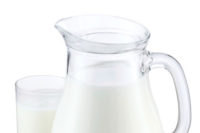Soy Protein May Lower BP

Compared to the participants in a government-funded study who ingested the least amount of soy protein, the highest level of soy intake correlated with a 5.52mm Hg reduction in systolic blood pressure (P<0.05), Safiya Richardson, a medical student at Columbia University in New York, reported at the annual meeting of the American College of Cardiology.
Joanne Foody, MD, associate professor of medicine at Brigham & Women's Hospital and Harvard Medical School, in Boston, said, "Despite the attempts to account for many confounders and variables, I think it is still possible that soy consumption is a surrogate for a healthier lifestyle which could account for the drop in blood pressure." Foody, who was not involved in the study, suggested that further studies would be required to determine how much soy impacts blood pressure.
"On the other hand, there is no particular detriment to taking soy protein in the diet, provided that soy is a replacement for other protein and not a supplement that would result in additional calories," she told MedPage Today. "We do not want people to increase calories in attempting to get more soy protein in their diet."
In her study, Richardson accessed data from the long-running CARDIA trial that included 5,115 white and black Americans ages 18-30. She extracted data from the 20-year information from 589 of these participants.
"What's unique about this study is that the results are very applicable to the general population. Our results strongly suggest a blood pressure benefit for moderate amounts of dietary isoflavone intake in young black and white adults," said Richardson at a press briefing sponsored by the ACC.
The lowest level of soy isoflavone consumption was 0 to 0.33mg/day; the next quartile consumed 0.33-0.73mg of soy isoflavone a day; the third quartile ingested 0.73-2.5mg of soy isoflavones per day, and the top quartile took in more than 2.5mg per day, she said. The difference between the top quartile in consumption and the lowest was the only difference that achieved statistical significance.
Richardson said an 8oz. glass of soy milk has about 22mg of isoflavones, and 100g of roasted soybeans have as much as 130mg.
"This could mean that consuming soy protein, for example, in combination with a DASH diet -- one that is high in fruits and vegetables, low-fat dairy and whole grains -- could lead to as much as a 10mmHg drop in systolic blood pressure for pre-hypertensives, greatly improving their chances of not progressing to hypertension," said Richardson.
"Any dietary or lifestyle modification people can easily make that doesn't require a daily medication is exciting, especially considering recent figures estimating that only about one-third of American hypertensives have their blood pressure under control."
Richardson suggested that isoflavones work by increasing the production of enzymes that create nitric oxide, a substance that helps to dilate or widen blood vessels, thereby reducing blood pressure.
From the March 30, 2012, Prepared Foods’ Daily Update
Looking for a reprint of this article?
From high-res PDFs to custom plaques, order your copy today!



